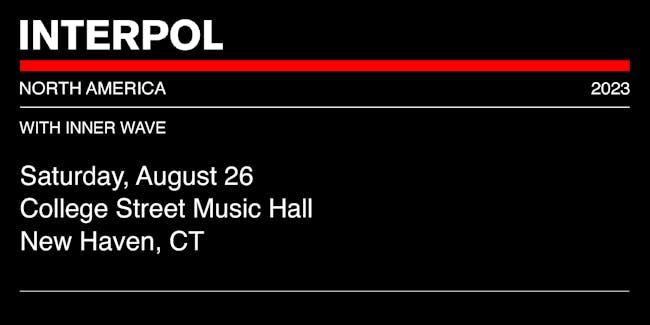Interpol – Tickets – College Street Music Hall – New Haven, CT – August 26th, 2023

Interpol
Inner Wave
Add to Calendar
This event is General Admission Standing Room on the Floor, and Reserved in the Balcony.
INTERPOL
“Still in shape, my methods refined,” sings Paul Banks on ‘Toni’, the opening track and lead single from Interpol’s 7th LP The Other Side of Make-Believe. The album breaks fresh ground for the group: parallel to exploring the sinister undercurrents of contemporary life, Interpol’s new songs are imbued with pastoral longing and newfound grace. Daniel Kessler’s serpentine guitar arrangements crest skywards, Samuel Fogarino shatters his percussive precision into strange metres, while Paul Banks’ sonorous voice exudes a vulnerability that is likely to catch most long-term fans of the band off guard. After all, says Banks, “there’s always a seventh time for a first impression.”
The Other Side of Make-Believe began remotely across 2020. In early 2021, Interpol reconvened to flesh out new material at a rented home in the Catskills, before completing it later that year in North London, working for the first time with production veteran Flood (Mark Ellis), as well as teaming up again with former co-producer Alan Moulder.
If fate didn’t quite ordain the circumstances for Interpol’s seventh album, it was at least fortunate that the band had happily concluded their Marauder cycle on stage in front of 30 thousand-odd Peruvian fans. Rather than be sent scrambling like so many other musicians, when the first lockdown clamped Interpol had no new release to promote and no tour to rearrange. They quickly got into a productive mood.
Writing on their own in those geographically-dispersed early stages gave the members a way out of their respective heads: “We really extracted the honey out of this situation”, says Fogarino. Kessler echoes the sentiment: “Working alone was raw at first, but has opened up a vivid new chapter for us.” In the Interpol Venn Diagram, each member found a way of expanding their individual circle in perfect harmony.
As Banks was grounded in Edinburgh for close to nine months, he got cosy in a window-side chair with a pen, pad and atypically cream-coloured bass guitar. “We usually write live, but for the first time I’m not shouting over a drumkit,” he says. “Daniel and I have a strong enough chemistry that I could picture how my voice would complement the scratch demos he emailed over. Then I could turn the guys down on my laptop, locate these colourful melodies and generally get the message across in an understated fashion.” Banks adjusting his personal volume dimmer to a hush chimes with a period of global disquiet and the yearn for reconnection: “It’s like Mickey Rourke in Barfly, singing to a patron at the end of the tabletop, and we never felt the need to flip that smoky intimacy into something big and loud when it came to rehearse and record. I got a real kick out of doing the opposite.”
Coming from a group whose early material was characterised by Polish knife-wielders and incarcerated serial killers, you might expect Interpol’s take on the present day to be an emotional tar pit — perhaps doubly so, given the towering credentials of Flood and Moulder’s history with Nine Inch Nails, Curve, Gary Numan, Depeche Mode and more.
Yet Banks felt the call to push in a “counterbalancing” direction, with paeans to mental resilience and the quiet power of going easy. “The nobility of the human spirit is to rebound,” he says. “Yeah, I could focus on how fucked everything is, but I feel now is the time when being hopeful is necessary, and a still-believable emotion within what makes Interpol Interpol.” Kessler concurs: “The process of writing this record and searching for tender, resonant emotions took me back to teenage years; it was transformative, almost euphoric. I felt a rare sensation of purpose biting on the end of my fishing rod and I was compelled to reel it in.”
Even with spare piano caressing the intro of ‘Something Changed’, open-hearted cyclical chord progressions on ‘Passenger’, or anthemic waves of Kessler’s cresting guitar on ‘Big Shot City’, it doesn’t mean Interpol are entirely stopping to smell the roses, though. The Other Side of Make-Believe’s title, cover and a frequent lyrical lean toward fables, smokescreens and the mutability of truth reflect Banks’ disgust with the curdling of the information age. “I feel like the slipperiness of reality, and being willing to get violent on the basis of a factual disagreement, has had a super strenuous effect on the psyche of everyone in the world. Although,” he laughs, “I was talking about it so often that it kind of spooked my bandmates, so I found a way to express my concerns more through the lens of human beings’ non-rational faculties, and less civilizational collapse.”
On The Other Side of Make-Believe, a deep interpersonal understanding means each member respects the other’s respective strengths better than ever, letting Interpol’s elemental qualities shine through. Song by song, Kessler sketches the architectural blueprint (invariably while watching a film — locus of inspiration for almost every song in the band’s catalogue), Banks frames artwork on the wall, then Fogarino arranges the furniture to have a certain positioning and intent.
Fogarino highlights Flood’s part in this equation “was to hyperbolise all of our good qualities. Our band has never exploited rock ‘n roll tropes, no big drum fills or wailing solos, so he located the core honesty in our sound and found a way to widen it. There’s a phrase I love about drumming: ‘the rhythm hates the melody’ — the best kind of drumming either totally accentuates what’s being conveyed, or ploughs through it.” So what does the splashy, dramatic beat on songs like ‘Renegade Hearts’ and ‘Gran Hotel’ imply? The answer comes back with a grin: “I guess Flood gave me room to plough.”
The band found themselves struck by the producer’s egoless way of operating and the breeziness of recording in his North London studio. They also seem charged by how much Flood and Moulder complimented, rather than challenged, their kinetic energy when performing. “I wouldn’t change a thing,” Kessler states. And though he means Flood and Moulder’s contributions, that sentiment extends to Interpol’s work as a whole.
The Other Side of Make-Believe will soon feel as familiar in the public consciousness as it is to Paul Banks, Daniel Kessler and Sam Fogarino. Ever the paradox, the noirish trio have weathered nearly seven albums’ and several line-ups’ worth of rollercoasters far better than anyone might have predicted, never letting their sense of purpose escape. Over time, tags like ‘alternative’ and ‘indie’ have even faded from view. They are simply a rock group nowadays; one of the most distinctive, consequential and enduring rock groups of the 21st century so far. And a quarter-century into their lifespan, the band are all fired up again.
Interpol: their methods refined, still in terrific shape.
– Gabriel Szatan
Links: Official Website | Facebook | Instagram | Twitter | Spotify
INNER WAVE
This September 30th marks the 15th anniversary of the first rehearsal of what we now know as LA-based band Inner Wave. Its founding trio set off as middle schoolers with a certain kind of gusto, and they’ve never forgotten it. Now in their 20s, Inner Wave is readying the release of a fourth LP, Apoptosis, and its members feel more musically connected and confident than ever before.
Without downplaying the difficulties—because of course, through such a long journey there’s been plenty of them—it is because of a single, steadfast credo that Inner Wave has endured, and it’s why the group continues to grow. They care immensely about the craft of music-making.
Over the past few years, however, that guiding premise was inadvertently compromised. Things were moving quickly; they’d toured particularly relentlessly and released heaps of singles since the popularity of 2017’s Underwater Pipe Dreams. But when the pandemic hit last year, of course, a slow-down was unavoidable.
Tours supporting WYD, an EP released last spring, were canceled. As Covid-19 cases hit a terrifying high, guitarist-vocalist Pablo Sotelo contracted coronavirus. Drummer Luis Portillo was not spared, either, although thankfully, neither became gravely ill.
“We were in a position where we felt we were at a high, and then sunk to a really dark low, not knowing what’s going to happen—not just with us, but with the world,” Sotelo recalls.
Even without the unprecedented stress of surviving a global pandemic, Inner Wave was already off-course, scattered. The mandated hiatus and the reasons for it were frightening. But if they were to continue, Inner Wave would absolutely have to regroup and refocus.
Pablo Sotelo, Elijah Trujillo (guitar), and Jean Pierre Narvaez (bass, vox) are the founding members, but Inner Wave is actually a quintet, and now in its tightest formation yet. Drummer Luis Portillo, who’s been with the band since 2017, is obsessed with his craft. Sound engineer Jose Cruz was incorporated late in 2020 as keyboardist, and his tenacity (and genius, all agree) is unparalleled.
Cruz fit right in, Trujillo notes: “He understands the type of level of musicianship that we have, and puts in the effort to take it to that next level, to go home with a notebook full of chords that he figures out and brings back the next day—without us even having to ask him.”
Discipline—specifically, a commitment to lifelong learning of music-making—is a massive force in Inner Wave’s flow. As kids, Sotelo, Trujillo, and Narvaez drilled and drilled, practicing for hours after school every day. This dedication remains foundational; a certain intensity of effort is essential to Inner Wave.
“Coming out of this pandemic,” Sotelo says, “having gone through so much and restructuring our team, we reverted back to being very hands-on—like we were for 11 years. Now I feel very confident: we’re like a musical tank.”
The newly unified five-piece spent two weeks quarantined at True Sound, a recording studio where Cruz also lives. Surprisingly, this was their first-ever experience recording a full-length in a studio.
Out on September 30th, Apoptosis is a trip into the band’s familiar realm of electronic, soul, and garage-rock. This time, however, the details are especially intricate, with unexpected synth accents that somehow both meld and stand out; they feel necessary, like the crevices and sharp edges of a mountain. Through these well-resolved musical moods, the intentionally ambiguous lyrics are strongly conveyed, yet left up to the listener for pondering. Apoptosis is experimental yet intentional. It is far-fetched in theory, but not out of reach in its final presentation.
“Apoptosis is a biological term for the death of cells, which occurs as a normal and controlled part of an organism’s growth or development. Basically, it’s when your body lets certain cells die so that new healthy cells can grow,” Sotelo explains. “It was indicative of what we had just gone through this whole year, with losing a member, losing management, losing a tour, shows, losing friends, losing almost everything. And then starting from the ground up.”
Today, Inner Wave is a result of all those tribulations as much as it is all the toiling toward progress done despite them.
“We finally got to have that experience where we’re all in the room writing a song and we all just kind of know what we want; it’s so exciting,” Narvaez says. “During these times we learned to adapt and grow as individuals, and more importantly, as a unit. I feel like Apoptosis is one of our best musical works so far because of these moments. Every hardship evolves into something beautiful.”
Links: Official Website | Facebook | Instagram | Twitter | Spotify
College Street Music Hall
238 College Street
New Haven, CT, 06510
